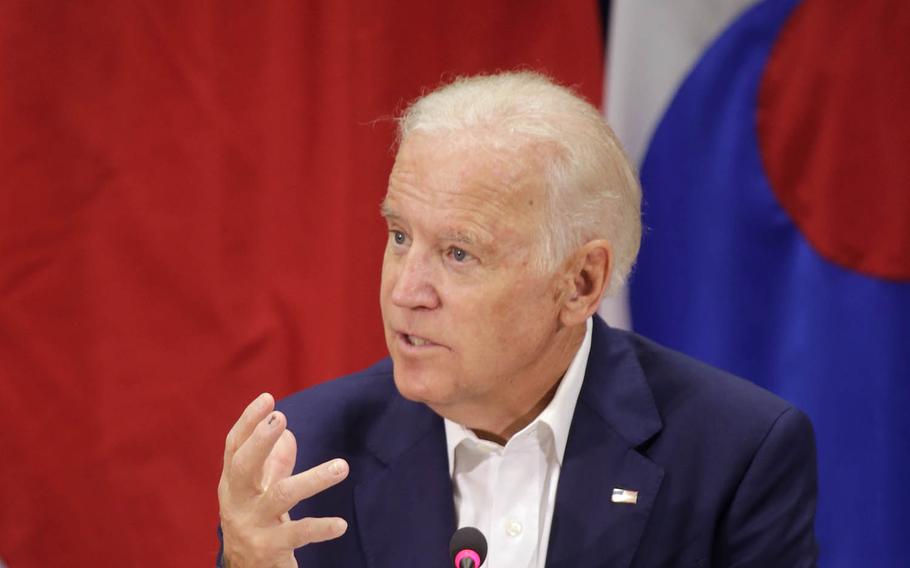
Then-Vice President Joseph Biden discusses the the U.S.-Japan-South Korea relationship during a trilateral meeting at the Daniel K. Inouye Asia-Pacific Center for Security Studies in Honolulu, Hawaii, July 14, 2016. (Jesse Hall/APCSS)
A day after President-elect Joe Biden delivered a victory speech in his home state of Delaware, U.S. allies and partners in the Indo-Pacific region issued a stream of congratulatory messages.
But Chinese President Xi Jinping, so far, has yet to weigh in.
From Seoul, South Korea, President Moon Jae-in on Sunday tweeted: “I very much look forward to working with you for our shared values. I have great expectations of advancing and opening up the future development of our bilateral relations.”
Among the tasks facing a new administration will be settling a rift with South Korea over its share of costs associated with stationing 28,500 U.S. troops on the peninsula. President Donald Trump pushed for Seoul to pick up as much as five times what it currently pays, and the stalemate has meant furloughs for thousands of South Korean workers at U.S. military bases.
Other Indo-Pacific leaders expressed continued support for keeping the Indo-Pacific “free and open” in cooperation with Biden and his vice president elect, Kamala Harris. The phrase, often repeated in Defense Department statements and embedded in the 2018 National Defense Strategy, refers to “deterring aggression, maintaining stability and ensuring free access to common domains,” including the South China Sea.
“Warm congratulations to @JoeBiden and @KamalaHarris,” Japan Prime Minister Yoshihide Suga wrote Sunday on Twitter. “I look forward to working with you to further strengthen the Japan-US Alliance and ensure peace, freedom, and prosperity in the Indo-Pacific region and beyond.”
From Australia, Prime Minister Scott Morrison in a statement posted on his website Sunday, listed “ensuring a free and open Indo-Pacific region” as chief among the world’s challenges after tackling the coronavirus.
Morrison said he looked forward to working with Biden to fight the pandemic, “drive a global economic recovery and develop new technologies to reduce global emissions as we practically confront the challenge of climate change.”
“American leadership is indispensable to meeting these challenges and upholding the rules, norms and standards of our international community,” he said.
Morrison also thanked Trump and his administration “for their contribution to the Australia-U.S. relationship.”
“Australia has enjoyed a strong working relationship with the current administration, one that has seen the strength of our alliance continue to grow and deepen,” he said. From India, Prime Minister Narendra Modi tweeted Sunday that Biden’s work as vice president toward “strengthening Indo-U.S. relations was critical and invaluable” while congratulating him on his win.
He also congratulated Harris, calling her success “pathbreaking and a matter of immense pride not just for your chittis, but also for all Indian-Americans,” using the Indian term for “aunties.” Harris, whose mother was born in India, used the term at the Democratic National Convention while accepting the nomination for vice president.
In Beijing on Monday, Xi had yet to issue a statement, but China’s state-run media offered cautious optimism about U.S.-China affairs under the new administration after four years of rising military and economic tensions between the nations.
“Compared to Trump’s direct style, Biden will be more moderate,” the state-run Global Times reported Monday, citing an anonymous Chinese military expert. “In the military sector, Trump had always been aggressive and trying to ‘show some muscles.’”
Under Trump’s leadership, the Defense Department formally shifted its focus to the Indo-Pacific, listing China as a “strategic competitor” in the National Defense Strategy and calling the region its “priority theater” in a June 2019 strategy report.
“Inter-state strategic competition, defined by geopolitical rivalry between free and repressive world order visions, is the primary concern for U.S. national security,” the DOD said in its report. “In particular, [China] seeks to reorder the region to its advantage by leveraging military modernization, influence operations, and predatory economics to coerce other nations.”
The Chinese military expert expected Biden to tone down Trump’s “aggressive stance” against China and reduce the frequency of military freedom-of-navigation missions in the South China Sea.
But U.S. pressure on Beijing is expected to continue as the president-elect will bring together “more allies to further isolate China,” according to the Global Times.
Since 2017, the U.S. Navy has increased the frequency of freedom-of-navigation operations to contest Chinese claims in the South China Sea that are not recognized under international law. The Air Force conducts overflights of the area, as well.
China routinely complains about the presence of U.S. planes and warships in the Taiwan Strait or near disputed island chains in the South China Sea.
The state-run paper on Sunday wrote that the “Chinese people’s attention and enthusiasm is only temporary, as the bumpy road of China-US relation has taught them a hard lesson that the U.S.’s antagonistic policies toward China will not stop, no matter who the president is.”